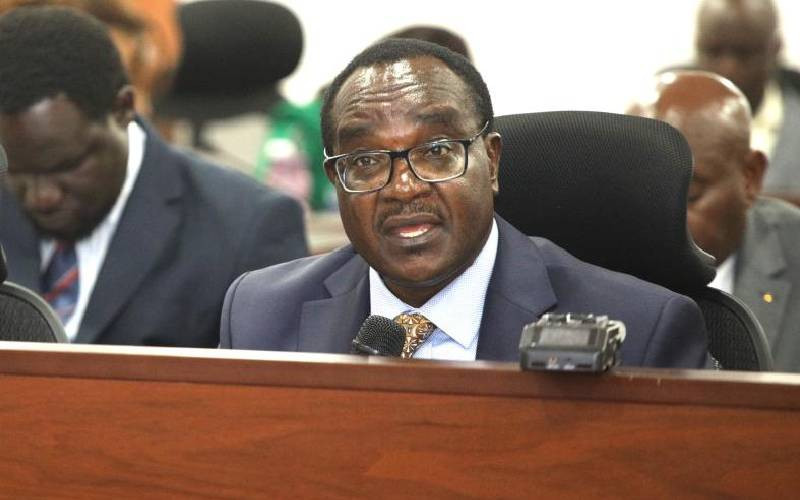Education CS Julius Migos Ogamba before the National Assembly's Education Committee to deliberate on management issues and welfare of staff at the Technical University of Kenya ,as well as address the management issues at the University of Nairobi,at Bunge Towers, Parliament, Nairobi. March 19th,2025. [Elvis Ogina, Standard]
Education Cabinet Secretary Julius Ogamba has accused Prof. Amukowa Anangwe of blocking a representative of the Ministry of Education from attending the University of Nairobi council meetings. This is despite the Higher Education Principal Secretary holding a permanent seat in all public university councils.
The CS now indicates that this is part of the reason the Ministry of Education on February 22, revoked his appointment as the council chairman of the university.
Ogamba said that the Ministry had shelved the decisions made by the council on that day.
“This is among the evidence we will attach to our response in court,” Ogamba told MPs while appearing before the National Assembly Education Committee.
The CS also stated his commitment to replacing the council chair, stating that the Ministry of Education is working on a response to a court decision that reinstated the chair.
The revelations further exposes the leadership crisis at Kenya’s premier university which has been
Prof. Anangwe was ousted on February 22, 2025, following complaints from the Universities Academic Staff Union (UASU) and the National Assembly’s Education Committee over allegations of mismanagement and governance conflicts.
However, on February 26, 2025, the High Court issued an order reinstating Prof. Anangwe and barred both CS Ogamba and the Attorney General from appointing a replacement until the case challenging his dismissal is heard.
The court scheduled April 2, 2025, for mention to set an expedited hearing date.
Prof. Anangwe, appointed as UoN Council Chair on May 24, 2023, has faced criticism over his leadership style. His tenure has been marked by controversy, including the dismissal of Vice-Chancellor Prof. Stephen Kiama following internal conflicts.
University lecturers have since threatened to go on strike, alleging that Anangwe has overstepped his mandate by interfering with administrative functions.
The University and Academic Staff Union (UASU) accused him of taking over key decision-making roles meant for the Vice-Chancellor, issuing transfer letters, extending staff contracts unilaterally, and participating in internal interviews.
“Prof. Anangwe is behaving as if he is the Vice-Chancellor. He has been unilaterally issuing transfer letters, extending staff contracts at his personal whim, and sitting in internal interviews. This blatant overreach is unacceptable,” said UASU UoN Chapter Secretary Dr. Maloba Wekesa. By Lewis Nyaundi, The Standard
Additionally, UASU raised concerns over the university council’s plan to lease unutilized land, arguing it could compromise the institution’s financial stability.
They also criticized the council’s decision to enforce retirement at 70, despite the law setting the retirement age at 74, describing it as “an assault on academia” that threatens the university’s intellectual capital.






